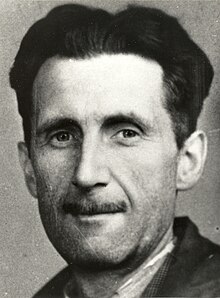ஜார்ஜ் ஆர்வெல்
ஜார்ஜ் ஆர்வெல் (George Orwell, ஜூன் 25, 1903 – ஜனவரி 21, 1950) ஒரு பிரிட்டானிய எழுத்தாளர் மற்றும் இதழாளர். ஆங்கில எழுத்துலகின் முக்கிய ஆளுமைகளில் ஒருவராகக் கருதப்படும் இவரது இயற்பெயர் எரிக் ஆர்தர் பிளைர் (Eric Arthur Blair). ஆர்வெலின் படைப்புகளில் அவரது கருத்துத் தெளிவு, சர்வாதிகாரத்துக்கு எதிரான நிலைப்பாடுகள், ஜனநாயக சமதர்ம ஆதரவு, சமூக அநீதிகளுக்கெதிரான அறச்சீற்றம், மொழியாளுமை ஆகியவை காணக்கிடைக்கின்றன.
ஜார்ஜ் ஆர்வெல் | |
|---|---|
 ஆர்வெலின் இதழாளர் அடையாள அட்டை புகைப்படம் (1933) | |
| பிறப்பு | எரிக் ஆர்தர் பிளைர் 25 சூன் 1903 மோத்திஹரி, பீகார், பிரித்தானிய இந்தியா |
| இறப்பு | 21 சனவரி 1950 (அகவை 46) கேம்டன், லண்டன், ஐக்கிய இராச்சியம் |
| அடக்கத்தலம் | சட்டன் கோர்ட்னே, ஆக்சுஃபோடுஷயர் |
| புனைபெயர் | ஜார்ஜ் ஆர்வெல், ஜான் ஃபிரீமேன்[1][2] |
| தொழில் | எழுத்தாளர், இதழாளர் |
| குறிப்பிடத்தக்க படைப்புகள் | ஹோமேஜ் டூ காத்தலோனியா (1938) அனிமல் ஃபார்ம் (1945) நைண்ட்டீன் எய்ட்டி-ஃபோர் (1949) கட்டுரைகள் |
| துணைவர் | அய்லீன் ஓ’ ஷானெஸ்சி (1935–1945) சோனிய புரவுன்வெல் (1949–1950) |
அர்வெல் புனைவுகள், தருக்க பத்திகள், கவிதைகள், இலக்கிய விமர்சனம் என பலவகைப்பட்ட படைப்புகளை எழுதியுள்ளார். பிறழ்ந்த உலகுப் (dystopia) புதினமான நைண்ட்டீன் எய்ட்டி ஃபோர், கம்யூனிசத்தை கேலி செய்த அனிமல் ஃபார்ம் ஆகிய இரண்டும் அவரது உலகப் புகழ்பெற்ற படைப்புகளாகும். இவை தவிர எசுப்பானிய உள்நாட்டுப் போரில் குடியரசுப் படைகளில் தன்னார்வல வீரராக பங்கேற்ற அனுபவங்களைத் தொகுத்து எழுதிய ஹோமேஜ் டூ காத்தலோனியா மற்றும் இலக்கியம், அரசியல் மொழி, பண்பாடு ஆகிய தலைப்புகளில் அவர் எழுதிய பல கட்டுரைகளும் சிறந்த படைப்புகளாகக் கருதப்படுகின்றன. தற்காலம் வரை ஆங்கில இலக்கியம், பண்பாடு, மொழி ஆகிய துறைகளில் ஆர்வெல்லின் தாக்கம் உணரப்படுகிறது. அவர் உருவாக்கிய புதுமொழிகள் (neologisms) பல இன்றளவும் பயன்பாட்டில் உள்ளன. அவை தவிர Orwellian (ஆர்வெல் படைப்புகளில் வருவது போன்ற) என்ற ஆங்கில பதமும் வெகுஜனப் பயன்பாட்டில் இடம் பிடித்துவிட்டது.
மேற்கோள்கள்
தொகு- ↑ Orwell, George (1998). Davison, Peter (ed.). I Have Tried to Tell the Truth: 1943–1944. The Complete Works of George Orwell. Vol. 16 (1 ed.). Secker & Warburg. p. 37. பன்னாட்டுத் தரப்புத்தக எண் 0436203774.
George Orwell's payment book for 20 December 1943 records the sum of pounds 5.50 for a special article of 2,000 words for Tribune. This has never been traced in Tribune under Orwell's name but it now seems certain that an essay, entitled 'Can Socialists Be Happy?' by 'John Freeman' is what is referred to. The name Freeman would have appealed to Orwell as a pseudonym, and the article has many social, political and literary links with Orwell, such as the relation of Lenin to Dickens (the fact that Lenin read A Christmas Carol on his deathbed also appears in the second paragraph of Orwell's 1939 essay, 'Charles Dickens'). A 'real' John Freeman, later editor of the New Statesman, has confirmed that he did not write the article. The reason why Orwell chose to write as 'John Freeman' he never used this pseudonym again is not clear. It may be that Tribune did not want its literary editor to be seen to be associated with its political pages. Possibly it was a device that allowed Orwell to be paid a special fee. Or it may be that he simply wished to see how far Tribune would let him go with his opinions. In any case, the article appeared in the Christmas issue and provoked much debate in the issues that followed. The 'lost essay' is included in the Collected Works and printed here for the first time under Orwell's name.
- ↑ Bradfield, Scott. "Orwell's every word: The Complete Works of George Orwell", Times Higher Education, 24 July 1998. Retrieved 27 December 2009.